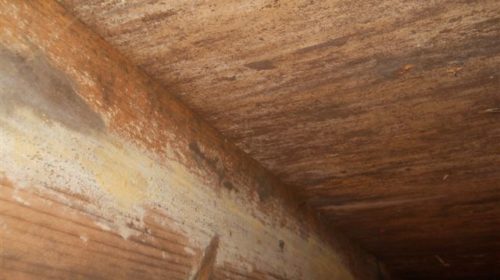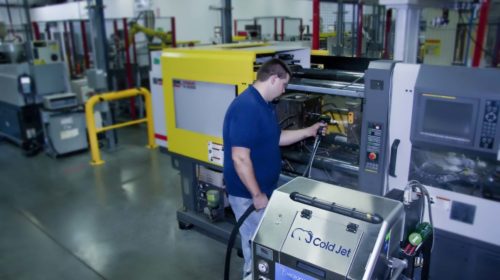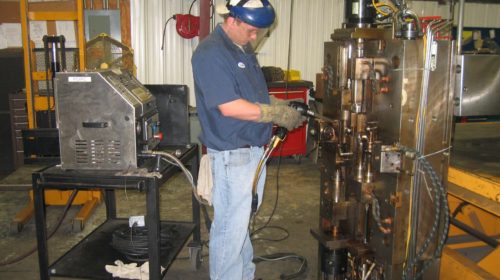
Cleaning plastic molds for the manufacture of sanitary products
THE SITUATION
The Geberit Group operates world-wide and is the European market leader for sanitary products. Geberit has a strong local presence in most European countries
and can therefore offer unique added value both in the field of sanitary technology and in the field of bathroom ceramics. The manufacturing facilities include 29 production plants, of which six are overseas. The Group headquarters is located in Rapperswil-Jona, Switzerland. With around 12,000 employees in approximately 50 countries, Geberit generated sales of CHF 3.1 billion in 2018. Geberit’s shares are listed on the SIX Swiss Exchange and have been included in the SMI (Swiss Market Index) since 2012.
Environmental responsibility, resource efficiency, work safety and innovative thinking are the keys to sustainable production. For this reason, Geberit has continuously developed their production and actively reduced environmental impact.
Global standards help to consistently exploit potential
for improvement and to achieve these ambitious goals. All production sites and all logistics work in accordance with ISO 9001 and ISO 14001.
THE PROBLEM
At the Jona production plant, plastic mold parts for sanitary applications are manufactured as semi-finished products or as direct salable articles. Highly complex tools, made of steel, are used productively as plastic geometry generators in the discontinuous injection molding process. During fully automated production, the tools become continuously dirty, both due to outgassing of plastic materials that grow and leak as low-molecular substances or due to the degradation of lubricating greases.
“These contaminants must be cleaned cyclically by professionally trained personnel so that we can guarantee our high part quality requirements as well as the usability of the tools over the entire production time and product life,” said Silvio Gächter, plastics engineer at Geberit Produktions AG.
For shot-based cleaning, the Tool Service & Storage team is available daily in the production plant. They perform their tasks directly at the injection molding machine as well as in the stationary workshop area using state-of-the-art inspection equipment. The highly sensitive tool contours as well as mechanical components are inspected by the team. The tools are professionally cleaned, serviced, maintained and stored again as a whole.
THE SOLUTION
The company knew it could improve their cleaning processes to further their efficiency and environmental standards. It turned to dry ice cleaning as a solution.
The company tested the Cold Jet i3 MicroClean S4 dry ice cleaning system, which uses Cold Jet patented (Block-Shaving) technology. The machine scrapes dry ice MicroParticles from a dry ice block and accelerates them to the speed of sound in order to blast impurities off the surface upon impact.
The combination of kinetic energy and thermal effect breaks the bond between the impurity and the surface. Since dry ice sublimates on contact, there are no traces of water. Cold Jet Systems do not damage or alter the sensitive surface.
The cleaning time of the injection molding machine with the mobile Cold Jet dry ice system was reduced by half compared to the previous cleaning process. This means that the costs due to machine downtimes (KPI & OEE values) as well as the cleaning efforts of the employees were significantly reduced. Additionally, more employee resources are available for preventative maintenance.
The health and safety of employees is the highest priority for Geberit. All relevant labor protection laws and safety standards are strictly observed. Geberit is also committed to securing jobs.
“We strive for a balance between economic, environmental and social goals,” said Gächter. “We categorically reject the ruthless pursuit of profit at the expense of the environment. This process supports the environmental program of Geberit Produktions AG.”
Many cleaning agents have aggressive substances that irritate the eyes, hands or respiratory tracts and can have an adverse effect on health. With dry ice cleaning, the use of cleaning agents is reduced to a minimum without compromising the cleaning result.
THE RESULTS
“During the task execution, various dry ice manufacturers and their products were compared,” said Gächter. “Cold Jet convinced us with its product range and solutions. We were also able to gain impressive practical experience at a demonstration and we received very positive impressions of the Cold Jet test system from our Jona production team. After understanding the system, it was also easy to see how and where we could use the system everywhere to save time and money. These findings alone were reason enough for us to order two systems at the same time.”
Geberit is recognized worldwide as one of the most progressive companies in the field of sustainability. They strive to achieve these high sustainability standards in the future, which was another reason why Geberit opted for a Cold Jet dry ice blasting system.
The Cold Jet systems are used daily for interval cleaning during production as well as stationary cleaning at the workbench or on the inspection device. The easy handling of the compact and mobile devices and the possibility of processing pellets, blocks or nuggets with the large Cold Jet nozzle range make it possible to cover a wide range of applications.
Geberit generates significant cost savings and cut cleaning time by approximately half. This leads to a reduction in the number of employees necessary and a reduction of expensive machine downtimes. Thus, the cost calculation and amortization quickly led to a positive result.

